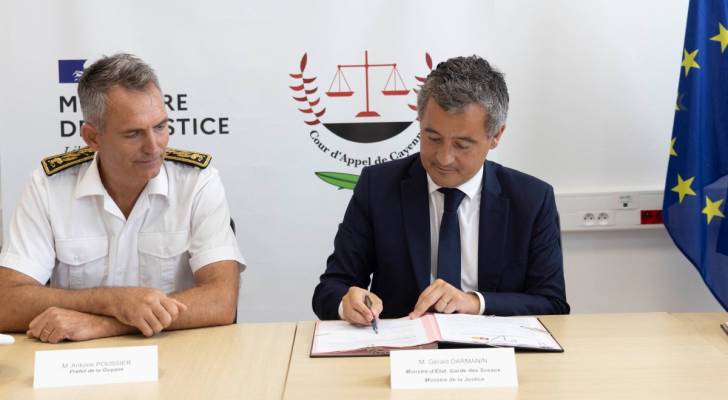France's Minister of Justice Gerald Darmanin (right) signing the Guiana Amazonian Park agreement (Credit: AFP)
France to build $450M high-security jungle prison in South America
France has unveiled plans to construct a 400 million euro (USD 451 million) high-security prison deep in the Amazon jungle of French Guiana, aimed at cutting off dangerous criminals from their networks and cracking down on organized crime.
The announcement was made by French Justice Minister Gérald Darmanin during a visit to the South American territory, where he emphasized the need for a tougher approach to drug trafficking and extremism.
The facility, expected to open by 2028, will be located in the remote northwestern commune of Saint-Laurent-du-Maroni—once the grim entry point to France’s notorious Devil’s Island penal colony. It will house up to 500 inmates, including a specialized wing for the most high-risk individuals.
In an interview with Le Journal du Dimanche (JDD), Darmanin described the upcoming prison as part of a broader national strategy to dismantle organized criminal operations.
“We want to incapacitate the most dangerous drug traffickers,” he said, noting that the prison would enforce an “extremely strict carceral regime.”
Crucially, the justice minister framed the facility as a tool to sever drug lords from their influence. “Drug lords will no longer be able to have any contact with their criminal networks,” Darmanin told JDD, citing the prison’s extreme isolation and security protocols.
French Guiana, a French overseas region bordering Brazil and Suriname, has long been a key transit point for narcotics smuggling routes into Europe. Officials hope the new prison—strategically located along these routes—will serve as a choke point for traffickers at the early stages of the supply chain.
The initiative follows a string of violent incidents across France in recent months, where prison staff and facilities have been targeted by armed attackers. In some cases, perpetrators set vehicles ablaze outside prisons or opened fire, claiming to act in defense of inmates’ rights.
French authorities suspect these attacks are a backlash to sweeping reforms aimed at dismantling criminal networks. Earlier this year, the government introduced new legislation to give prosecutors and investigators greater powers, and to offer special protections for informants. The law also provides for the construction of multiple high-security prisons, including the one in French Guiana.
The new facility will address long-standing challenges such as the widespread use of smuggled mobile phones in French prisons—tens of thousands are believed to be in circulation—by enforcing stricter controls on inmate communications.
French Guiana's unique legal status as an overseas region means its residents are full French citizens with voting rights and access to France’s social services. Yet its remote geography makes it an ideal site, officials say, for detaining individuals deemed too dangerous to remain on the mainland.
The jungle site also evokes echoes of history. Saint-Laurent-du-Maroni was the departure point for thousands of prisoners sent to the brutal penal colonies of the 19th and early 20th centuries, immortalized in Henri Charrière’s memoir Papillon, later adapted into a film starring Steve McQueen and Dustin Hoffman.




